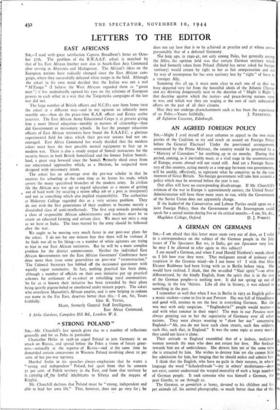STRONG POLAND "
Sin,—Mr. Churchill's last speech gives rise to a number of reflections generally and for us Poles in particular. Chancellor Hitler in 1938-39 urged Poland to join Germany in an attack on Russia, and spread before the Poles a vision of future great- ness—naturally at the expense of Rt.ssia—and at the same time he demanded certain concessions in Western Poland involving about to per cent. of her pre-war territory.
Marshal Stalin in his speeches always emphasises that he wants a " strong and independent " Poland, but apart from that he annexes 5t per cent. of Polish territory in the East, and from that territory he is carrying off•the lawful inhabitants to Siberia and the steppes of Kirghiz.
Mr. Churchill declares that Poland must be " strong, independent and able to lead her own life." That, however, does not go very far ; he • does not say how that is to be achieved in practice and at whose cost— presumably that of a defeated Germany.
Not long ago, in 1940-41, not only among Poles, but generally among the Allies, the opinion held was that certain German territory which she had formerly taken from Poland (Poland has never asked for foreign territory) would return by right to her as fair compensation and not by way of recompense for her own territory lost by " right" of force to a stronger Ally.
Summing this all up, it must seem clear to eaoh one of us that we have departed very far from the beautiful ideals of the Atlantic Charter and are drawing dangerously near to the doctrine of " Might is Right "; that doctrine against which the justice= and peace-loving nations went to war, and which war they are waging at the cost of such unheard-of efforts on the part of all their citizens.
May they not undergo disenchantment such as has been the experience
of us Poles.—Yours faithfully, J. PIETRZYCKI. 28 Eglinton Crescent, Edinburgh.


























 Previous page
Previous page